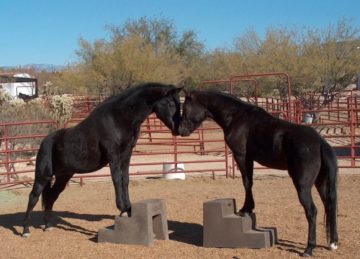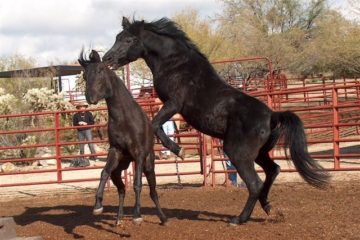A longtime dream of Eponaquest founder Linda Kohanov, The Merlin’s Spirit Program for Teens and Their Parents is
finally becoming a reality in 2017. Named after her stallion Merlin and his son Spirit, the program offers an efficient and engaging way for families to practice social intelligence, leadership, conflict-resolution, anti-bullying, and relationship skills through safe, and fun, ground activities with horses. The curriculum is designed to teach leaders of the future how to excel at home, school, work, and life.
“This year, we are launching a program in Southern Arizona that I hope to disseminate nationally very soon,” Linda reports. “I’m very excited to have an accomplished educator as a partner in creating and executing this very special curriculum.”
Over the last 20 years, Charlotte Richardson has worked primarily in the public school system, and currently teaches middle school special education and general education English Language Arts in a Tucson school district. A K-12, cross-categorical certified special education teacher, Charlotte has taught many grade levels, but for the past 14 years has taught 6th, 7th, and 8th grade.
In 2015, Charlotte added horse-facilitated learning techniques to her educational toolbox by graduating from the Eponaquest® Apprenticeship Program. Her school principal was so intrigued by the emotional/social intelligence and leadership skills Charlotte mastered that he asked her to teach the Eponaquest tools and principles at her school, five days a week in the classroom, with monthly trips to the barn. In 2016, Linda asked Charlotte to become a faculty member for the Eponaquest Apprenticeship Program to teach other professionals how to incorporate this work into programs for middle and high school students.
“Charlotte Richardson is a pioneer in bringing horse-inspired wisdom to the public school system and helping students translate it into purely human settings,” Linda says. “So when I finished my last book and finally had the time to develop a horse-facilitated program for teens and their parents, I knew she was the perfect person to enlist in this endeavor.”
Public School Curriculum
In the 2015-2016 school year, Charlotte’s daily class consisted of 7th and 8th-grade students, boys and girls. In the 2016-2017 school year, the program consisted of 7th and 8th graders, primarily girls, with 3 continuing students from the previous years.
Students draw upon their own experiences as they learn about:
- The five roles of successful leadership (from Linda’s book The Five Roles of Master Herder)
- Being an authentic leader (leadership/self-Leadership)
- Understanding and setting healthy boundaries
- Recognizing nonverbal stress responses in others, and helping to calm people and animals while gaining their trust
- Accessing & using emotions as Information (Healthy ways of dealing with uncomfortable/frightening emotions)
- Accessing the “Authentic Self” where creativity, individual talent, calling, and innovative problem solving reside
- Equine facilitated learning activities that reinforce and expand upon all of the above
- Emotional fitness and emotional heroism
- Relationship building
- Communication skills
- Mind-body awareness
Students are guided through studying the above and learning EFL activities in the classroom → Equine Facilitated Learning activities at the barn with horses as the teacher → back to the classroom and ‘real-life’ to put into practice.
Charlotte reports that “These students are eager and excited to share their experiences & stories, past and present; they step into the activities despite their vulnerabilities, and they push themselves out of their comfort zones. The relationships they have formed with each other and with the horses have shown them that authentic connection and relationship are possible, that they can set and hold their boundaries assertively without becoming aggressive.
“Some of the things the students we choose for this program bring: great leadership potential, motivation, compassion, and a longing for authentic connection. Some of the students also have eating disorders, self-harm, depression, ADD, acute shyness, lack of self-esteem, anger issues, learning disabilities, social anxiety, emotionally immaturity, childhood abuse, past and recent trauma, and a willingness to try. While they still struggle with issues, they are becoming stronger and more confident. Other teachers have noticed a change, particularly with a couple of ADD/ADHD students, noting their increased calm and focus after barn visits.”
The Next Level
In watching the program unfold, Linda and Charlotte realized that one of the biggest challenges in establishing such a class was that students were going home with sophisticated tools their parents didn’t have. “It’s extremely difficult for a child of practically any age (even as an adult) to teach his or her own parents how to become a more balanced, emotionally and socially intelligent parent and leader,” Linda says. “ This is why we felt that the next level of working with younger generations had to involve programs where children and their parents learn these skills together. This is the main focus of the Merlin Spirit Program for Teens and their Parents.”
The program will develop as a two-pronged approach: as a three-day workshop that teens and parents across the country can attend, initially at the Linda’s Southern Arizona ranch, and as four monthly sessions for regional participants.
“We are currently looking at dates during winter breaks and spring breaks for those who would need to travel for the three-day seminars,” Linda says. “And we are presenting our first regional program the first Saturday of every month starting in October 2017.”
Regional Program Details
Teens and their parents will learn how to:
- Manage emotions and use them as information for enhancing life and relationships
- Have productive conversations on challenging subjects
- Be assertive, not aggressive
- Set boundaries, and respect others’ boundaries
- Gain the trust of more sensitive horses, and translate these skills to working with sensitive people
- Gain the cooperation and respect of more dominant horses, and translate these skills to working with more dominant people who may also have a tendency to bully others
- Connect meaningfully with sensitive and dominant individuals—and everyone in between
- Read nonverbal signs of stress in others, and help calm others
- Handle contagious emotions in groups, including peers and family members
- Motivate stubborn or resistant individuals
- Handle aggressors in any social system (family, work, school, church), holding them accountable for hurtful or unproductive behavior, without alienating or shaming them
- Calm and focus others in a crisis
- Facilitate connections between those who might otherwise avoid contact
- Nurture and support others without stifling their attempts to makes choices and/or take care of themselves
- Lead through building rapport with a wide variety of personalities
- Read nonverbal communication in self and others
- Collaborate with others and work as a team
To inquire about attending this program, please send a letter of interest to Linda Kohanov at rasa@eponaquest.com by telling her about the teen/parent(s) who would like to attend: Names, ages, interests, challenges, and gifts.
“This is an equine-facilitated learning program, not equine-facilitated therapy,” Linda emphasizes. “We are particularly interested in those people who often fall through the cracks in educational services—where extremely gifted students are given certain opportunities on the one hand and people with learning disabilities, trauma and emotional challenges are provided with additional services on the other hand. Children and parents who fall somewhere in the middle are often left to figure out important life, relationship and leadership skills on their own. The Merlin’s Spirit Program is designed to support those teens and parents who would like to explore and practice the tools to truly enjoy and excel in life.”


